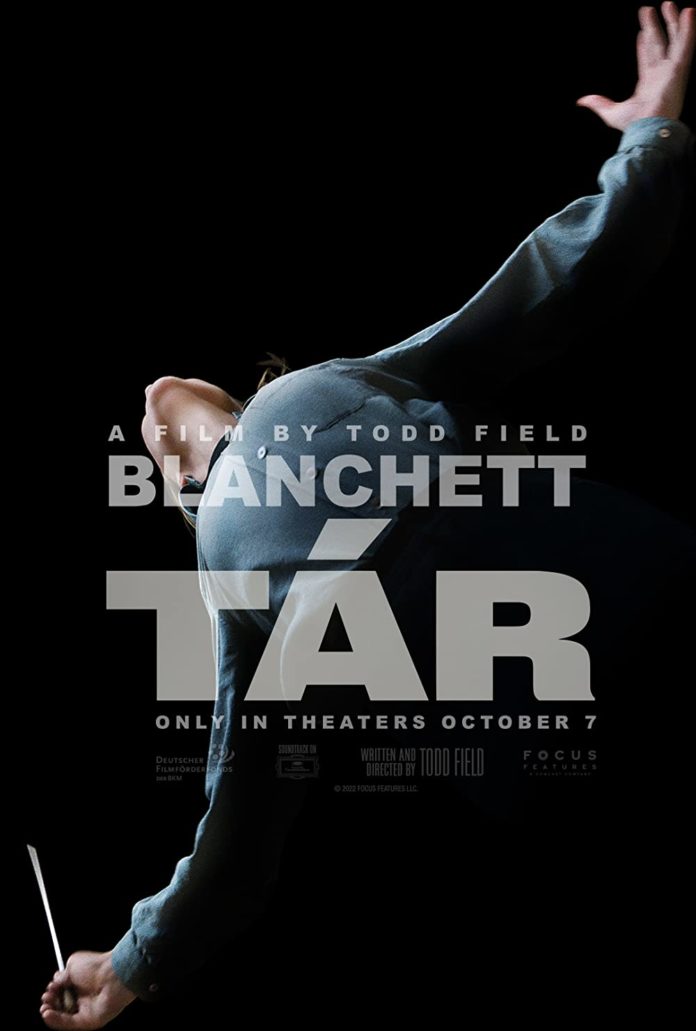After being absent from filmmaking for the past 16 years, writer-director Todd Field returns to the silver screen with “TÁR,” a 180-minute psychological epic starring Cate Blanchett that is a perfect marriage of direction, script and performance.
The fictional Lydia Tár (Blanchett) is a world-renowned classical music composer-conductor who is the first woman to lead the Berlin Pheromonic. The film’s first scene involves an interview with Tár that reveals her extraordinary list of credentials: She is an EGOT winner and visiting instructor at Juilliard, as well as running a fellowship for aspiring female conductors. It’s an impressive list that sets the stage for one simple fact. Tár is respected and admired, someone who every aspiring musician wants to work under.
The film follows Tár as her past creeps up on her like a pin inches away from a balloon. Almost methodically, Field’s script unravels the story and reveals the bigger picture, that Lydia herself is both the film’s protagonist and its antagonist. Small pieces of information, ever so slightly hinted at or divulged, keep the viewer constantly changing their feelings toward the titular character.
Field has crafted one of the best character studies in recent years by never judging the actions of his characters. Instead, every single one of her decisions become ammo for those affected by her actions. It is one of the first post-#MeToo films that feels genuine in its desire to show how despicable and inhumane individuals can be when they have god complexes.
Todd Field stated that he would not have made the film had Cate Blanchett passed on the role. There is no other actor than Blanchett, a two-time Academy Award winner, who could have the gravitas to step up to the film’s conductor’s podium. She deserves to be recognized for not only the best performance of the year, but also one of the most sincere and authentic of all time.
During a sequence where Blanchett’s Tár is teaching a class at Juilliard, the camera, in one single take, continues to follow her as she goes from soft-spoken teacher to attacking a student who rejects classic composers because of their politics. Watching Blanchett turn in a matter of minutes allows viewers to almost see the gears turning inside her character’s mind. It’s obvious that there is a bubble forming between the teacher and student, with only a matter of time before it bursts. Feeling this tension and watching Blanchett meticulously deliver each line, only to end with a powerful monologue, reminds the viewer that Blanchett is considered one of the best actors of all time for a reason.
This performance is elevated even further with the luscious direction by Field. He allows for the elegance and arrogance to perfectly blend together as an idol falls from her totem pole. Field, staying neutral throughout the film, allows the effects of modern day cancel culture to trickle in and haunt even the most prestigious and elite members of society.
While he allows us to follow Lydia for the entirety of the film, his script provides us with moments where we can gather enough information to make assumptions about other characters. This trust in the audience’s intelligence is what makes “TÁR” such a powerful film. Field never extends an inviting hand to guide you along the journey. Instead, he allows you to bear witness to Lydia’s fall from grace in a raw and uncomfortable way.
To compliment the film, composer Hildur Guðnadóttir, who won the Academy Award for “Joker,” delivers a score that provides the perfect nuance to the modernity of the film’s subject matter. It’s classical, tasteful and exactly the type of music that Lydia Tár would compose.
“TÁR,” while longer than most superhero fanfare, or sequel or spinoff that defaces most theater screens currently, earns its runtime for its deep dive into the complexities of a modern, socially conscious world. Todd Field’s return to cinema was not only greatly welcomed, but very much needed. The film’s commentary on cancel culture and abuses of power are timely, but these discussions will continue to live on as the film becomes a classic.








